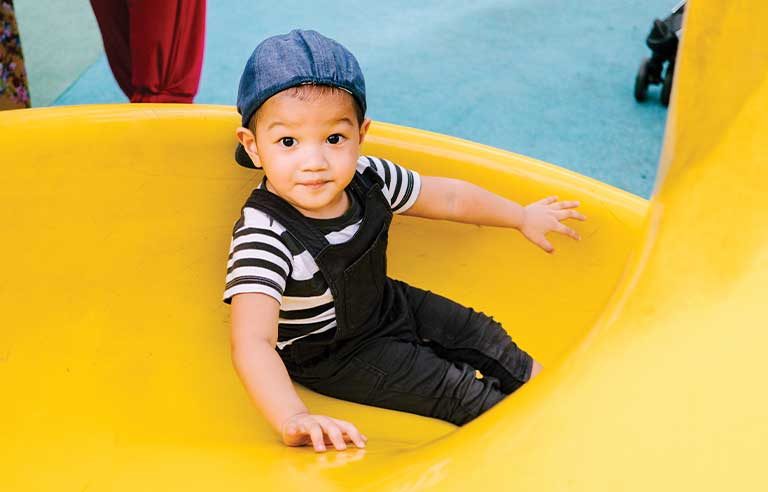Kids and concussions
Know the signs and symptoms

Photo: kiankhoon/iStockphoto
When you hear about kids getting concussions, does your mind automatically think of sports?
It’s true – contact sports can and do cause concussions. But when researchers from the Children’s Hospital of Philadelphia (CHOP) and the Centers for Disease Control and Prevention looked at concussion data for a 2018 study, they found that nearly two-thirds of the concussions among kids weren’t sports-related.
Kids can get concussions during all sorts of activities. Falling off a swing. Taking a tumble while climbing a tree. Even bumping their head on a wall while playing inside the house.
Here’s what you need to know about spotting the symptoms of concussion.
Watch for the signs
Concussions happen when the head or body sustains a hard blow or collides with another object that causes sudden movement of the head and brain inside the skull. This disturbs normal brain function.
“If you have a good head bang, it’s likely that you sustained a concussion or some sort of jarring injury to the brain,” said Karissa Niehoff, CEO of the National Federation of State High School Associations. “It can happen in just about any number of situations.”
Alcy Torres is an associate professor of pediatrics and neurology at Boston University. In a blog post on the American Academy of Pediatrics’ website, Torres lists common symptoms of concussion in kids and teens:
- Dazed or stunned appearance
- Clumsy movement
- Slow to answer questions
- Loss of consciousness (even briefly)
- Changes in mood, behavior or personality
- Unable to recall events before or after their injury
Torres adds that although symptoms typically appear soon after an injury, they may not surface until days later. Watch kids closely for:
- Headache
- Nausea or vomiting
- Balance problems
- Dizziness
- Vision problems
- Sensitivity to light or noise
- Sleep changes
- Trouble concentrating
- Feeling confused, “off” or “down”
Call the doctor
CHOP says several scenarios require calling 911 immediately. Make the call for anyone who:
- Shows impaired consciousness.
- Experiences seizures – twitching or jerking movement of parts of the body.
- Feels weakness or tingling in the arms or legs.
- Can’t recognize people or places.
- Is difficult to arouse or unable to awaken.
- Throws up repeatedly.
- Has fluid (bloody or clear) leaking from the nose or ears.
Be ready to call a doctor even if urgent symptoms aren’t present, Niehoff says.
“Ask the child: ‘Well, how did it happen? What are you feeling?’ and monitor them. And if any of those signs or symptoms are there, call the doctor, see if you can get the child in for a look, and certainly monitor the signs and symptoms, especially if they get to be severe.”
Torres recommends being as detailed as you can when talking with doctors. This’ll help them determine if imaging tests are needed.
Support recovery and wear a helmet
If a concussion has been diagnosed, experts advise getting lots of rest and avoiding mental and physical strain.
“In the first few days after concussion, reduce activities that require substantial brain and physical energy – such as school, work, sports, video games and social media – to allow symptoms to decrease and your body to deliver extra fuel to the brain to support recovery,” CHOP says.
Torres points out that recovery timetables differ and are dependent on:
- The severity and nature of the injury
- The child’s medical history, including previous concussions
- Treatments used
- How closely the doctor’s advice is followed
Meanwhile, everyone can help prevent concussions by wearing helmets when biking, skateboarding, sledding and playing contact sports.
“I think our communities are better prepared than ever before to know what a concussion is, how they might occur, how to prevent them as best as possible and then certainly what to do in the event that a concussion occurs,” Niehoff said. “We’re ready out there. We want parents and kids to enjoy activities and not be afraid and just know that if there is a concern to go to a medical professional – your doctor – and your child will be in good hands.”
Post a comment to this article
Safety+Health welcomes comments that promote respectful dialogue. Please stay on topic. Comments that contain personal attacks, profanity or abusive language – or those aggressively promoting products or services – will be removed. We reserve the right to determine which comments violate our comment policy. (Anonymous comments are welcome; merely skip the “name” field in the comment box. An email address is required but will not be included with your comment.)
